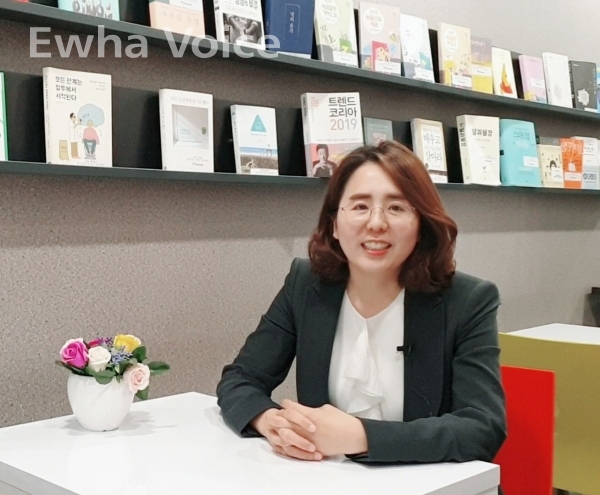
Getting into law school and becoming a lawyer requires both time and effort. Despite such demands, Ahn Hyun-joo, who graduated magna cum laude from the Department of Law, went on to become an attorney not only in Korea but also in the United States.
In 2002, Ahn passed the bar exam in Korea, when she was still an undergraduate. After completing her training at the Judicial Training and Research Institute, she started her career as a deputy director at the Korean Ministry of Foreign Affairs and Trade, working on legal matters regarding international trade and mediation, which mostly involved settling negotiations between Korea and the United States.
Ahn yearned to continue her study in the field of international trade. However, back then, the amount of related material in Korea could not provide her with enough expertise. To achieve her goal her, Ahn pursued further studies at the New York University School of Law and the University of Connecticut School of Law, which led to her becoming a lawyer in the United States.
“My dream was to work at an international organization, not to become a lawyer,” she said. “The decision to take the bar exam and get a practicing certificate was a step toward my final goal.”
As Ahn had different objectives from other judicial apprentices, she also revealed that during her training, she was lost for a while, not knowing how to proceed. Fortunately, she was able to get a job that was relevant to her ultimate goal.
What makes Ahn's story even more impressive is that she balanced studying and parenting while in law school. She commented that using her spare time in the early dawn was how she effectively dealt with both her.
“It was about doing one thing at a time,” she said. “When my children were at school, I immediately concentrated on my study. When they came back home, I focused on taking care of them.”
Since Ahn has an extraordinary background of studying and working in the field of law in two different countries and with distinct legal systems, she shared some thoughts on how law institutes in Korea and the United States are different from her own perspective.
Ahn feels that the Korean institute mainly aims to transmit a certain amount of knowledge to the trainees, which helps them to reinforce capabilities by teaching theories so that they can apply their learning on the spot.
On the other hand, rather than providing particular knowledge, American law schools primarily focus on backing trainees up to enhance their practical abilities by assigning actual cases to resolve so that they will be prepared to unravel any sort of case they will encounter. She also mentioned the common denominator is that both require trainees to research and analyze diverse precedents.
Along with her observations about academia, Ahn shared her authentic job experiences as well. Having been educated in two different law schools, she remarked that such unique assets gave her the ability to adeptly arbitrate between two parties as well as the insight to prevent any misunderstandings derived from cultural differences. She mentioned that even a small misinterpretation can be led to disagreements or emotional conflicts.
“Someone who can compromise and give suggestions which both parties can be satisfied will be much needed in such cases,” she said.
Not only interceding, but Ahn also added that such experience made her be able to spot the points that each stakeholder was missing.
Ahn stated that she genuinely feels happy when she can give a hand to someone who needs one.
“I share legal information with foreign residents in Korea by translating it in English and give lectures about the American bar exam,” she said. “Most of the work that I do all started with one purpose: helping other people.”
When asked about her future career plan, Ahn replied that she wishes to work in a non-governmental organization someday, also seeking to pursue a free and flexible style of work at the same time.
Ahn stressed that demonstrating what kind of life she strives to live is more important than the achievements from her job itself.
For students interested in becoming an attorney, Ahn left an optimistic message that knowing the law will always matter.
“As society becomes more complex and diversified, there will be more room for law professionals to help sort out vague circumstances,” Ahn said. “I recommend that you dream of working in various, broad areas, not just something like a conventionally defined lawyer.”

